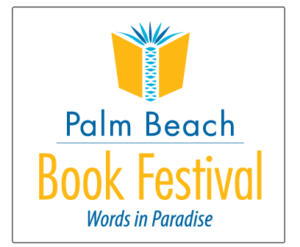 Whether you’re an avid reader or an aspiring author, if you get the chance to meet and listen to several bestselling authors all gathered in the same room, you go, don’t you? You want to know how they made it to the bestseller charts; or maybe more modestly you want to know how they wrote their successful novels; where they get their ideas, how they find the time to finish a novel? I know I always leap at such an opportunity. As I did a couple of weeks ago.
Whether you’re an avid reader or an aspiring author, if you get the chance to meet and listen to several bestselling authors all gathered in the same room, you go, don’t you? You want to know how they made it to the bestseller charts; or maybe more modestly you want to know how they wrote their successful novels; where they get their ideas, how they find the time to finish a novel? I know I always leap at such an opportunity. As I did a couple of weeks ago.
Only One Rule
A half-dozen bestselling authors shared their secrets, tips and more at the Palm Beach Book Festival last month. What they said about writing and publishing proved there’s no such thing as one set of rules for success when it comes to writing fiction. Three of those authors agreed however that there is one key rule for writing well, and it involves reading. And reading. And more reading.
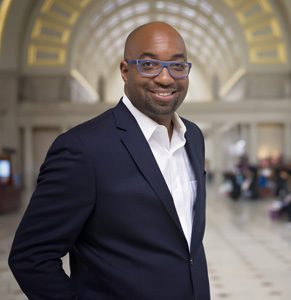 Kwame Alexander (photos), a poet and New York Times bestselling author of 24 children’s and young adult books including Solo and The Crossover, told readers and aspiring authors at the Festival that his parents were “extremely bookish.” He said, “They were both Columbia University graduates and I grew up with books ; reading was like breathing in our household. I knew books were going to consume my life.”
Kwame Alexander (photos), a poet and New York Times bestselling author of 24 children’s and young adult books including Solo and The Crossover, told readers and aspiring authors at the Festival that his parents were “extremely bookish.” He said, “They were both Columbia University graduates and I grew up with books ; reading was like breathing in our household. I knew books were going to consume my life.”
All That Matters
Almost literally in one instance, as Kwame tells it when he recounts the story of being involved with his family in an accident in a minivan on the New Jersey Turnpike. The family were on their way to the Harlem Book Fair and the van was loaded with books which spilled out during the accident.
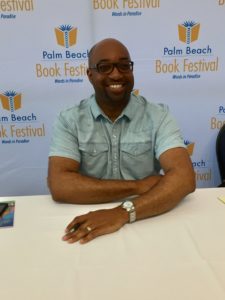 Said Kwame: “After assuring himself that everyone was all right, my father told me to get out of the car and pick up all the books that were strewn across the road, and there I was in the middle of the turnpike with cars stopped behind us while I picked up the books.
Said Kwame: “After assuring himself that everyone was all right, my father told me to get out of the car and pick up all the books that were strewn across the road, and there I was in the middle of the turnpike with cars stopped behind us while I picked up the books.
“My father was an author, and a literary dictator. There was no TV for me, just non-stop reading and writing. He’d say: “All that matters is words, books and literature. All that’s going to save you is books.” Kwame added that by the age of 11, he hated books and stopped reading. So, what brought him back? “In high school I discovered girls and started writing love poems, and in order to write them I had to read more of them.”
Read Everything
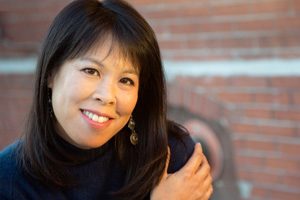 Now, his advice to new authors is “read everything you can get your hands on, write every day, and be a willing participant in life so you have something to write about.”
Now, his advice to new authors is “read everything you can get your hands on, write every day, and be a willing participant in life so you have something to write about.”
Mira T. Lee (pictured) was one of those new authors a few years ago when she decided to “dabble” in writing. She started with short stories, and one of her short stories formed the basis for the first chapter of her book, Everything Here Is Beautiful. The novel which has been named as a Most Anticipated/ Top Winter 2018 pick by more than 30 news outlets (including the Wall Street Journal, New York Magazine, Buzzfeed and Real Simple) is about the bond between two sisters, one of whom, Lucia, lives life on a grand scale, but is actually mentally ill.
Read A Lot In Your Genre
 Mira told the Festival audience: “I wanted to make her illness just one component of her life. I didn’t want it to be an illness book. I read a lot of short story writers and a lot of memoirs and personal journals, and first person accounts of psychosis.”
Mira told the Festival audience: “I wanted to make her illness just one component of her life. I didn’t want it to be an illness book. I read a lot of short story writers and a lot of memoirs and personal journals, and first person accounts of psychosis.”
However, Mira seemingly broke some basic rules for writing success: She said she did “not read any books about writing,” and she ignored conventional POV rules by mixing first and third person POVs throughout. “During the writing process, you just have to go with it,” she said.
Read Your Own Writing
Whereupon, Festival moderator, Leigh Haber, Books Editor for O, the Oprah Magazine interjected with: “That’s the advantage of not going to the Iowa Writers Workshop!”
Mira did acknowledge that she took some writing classes for a couple of years: “They taught me how to read my own writing with a critical eye.”
That’s what Joe Finder, bestselling author of 14 suspense novels (pictured below with Cathy Helowicz, Executive Director of Palm Beach Writers Group) does. “I read my own books out loud — every sentence. They have to be comfortable to the ear. I care a lot about how my books are written.”
Reading When In A Rut
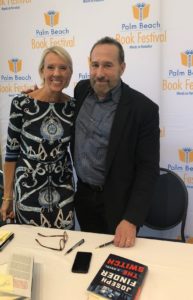 Does he get his ideas by reading? Finder, whose novel, Suspicion has been optioned for a TV pilot said that his ideas come from different places. For example, his latest thriller, The Switch is based on the “what if” idea that two people going through airport security pick up each other’s laptop. But he’s also gotten ideas from casual conversations. For example, one such idea presented itself after “someone told me in confidence that she had found a driver’s license with her husband’s photo, but with a different name.”
Does he get his ideas by reading? Finder, whose novel, Suspicion has been optioned for a TV pilot said that his ideas come from different places. For example, his latest thriller, The Switch is based on the “what if” idea that two people going through airport security pick up each other’s laptop. But he’s also gotten ideas from casual conversations. For example, one such idea presented itself after “someone told me in confidence that she had found a driver’s license with her husband’s photo, but with a different name.”
But he does read other thriller authors when he’s in a creative rut. It helps him get back onto his own writing treadmill: “I’ll pick up someone else’s book and say: ‘I can do this. I’m super critical of other thrillers. I’ll read (some plot points ) and think to myself, ‘I wouldn’t have done that’”
Note: If you’ve reached the end of this blog with a feeling of relief, well, that’s exactly how I felt when I finished writing (and posting) this one: Yesterday (Friday) morning, I lost all my internet and wifi connections and was told a) to go get my modem replaced (which I did) and b) when that didn’t work, that it was probably due to something wrong with the signal, and I’d need a technician visit — which couldn’t happen till Sunday, 48 hours later.
Never ever been without wifi here for that long!!!! Never before had to cruise around searching for a wifi hotspot!!!! If you’re reading this on a Saturday morning, it means I found one!
The Switch sounds intriguing! Have you read it Joanna?
Hi Eldon, I have not yet read this one. I’m a little on the fence about the premise since I cannot wrap my head around the idea of losing sight of my laptop for even a couple of seconds as it goes through on the conveyor belt. However, I know that Finder is a very fine, clever author so I am sure that there will be a very convincing scenario for such a switch.
Yes, I did feel relief at the end of this. I’ve studied well over thirty books on the craft of writing and taken a multitude of creative writing classes searching for the magic formula. Rather than leading me to the promised land of creating compelling stories, all of the info and contradictory RULES paralyzed me. I found relief in reading best-selling novels that broke many of these rules that agents and editors said must be followed. I think I have a pretty good understanding of the rules and no longer afraid to break them when needed to tell a story.
Definitely for every rule you read about, you can find a great book that broke that rule. I applaud your dedication, Greg. I hope you’ve found some great books to read and enjoy in the process.